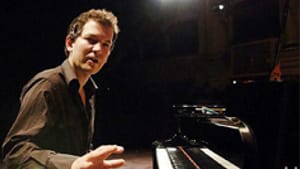Stay in the Loop
BSR publishes on a weekly schedule, with an email newsletter every Wednesday and Thursday morning. There’s no paywall, and subscribing is always free.
DAN COREN
Just about everyone, I imagine, has fantasized at one time or another about the paradoxes of time travel, about how simply knowing at first hand (never mind actually altering) how things really were in the past would change the present. What if we were to hear Mozart or Beethoven improvise, if we were to hear how they actually played their own music? If we could, I’m sure, every musical history book about the period would seem as comically misguided as the theories predicting that the first lunar lander would be swallowed up by dust.
For jazz musicians, though, the issue of time travel is very real. Few of the great iconic improvisers of the mid-20th Century— Charlie Parker, Dizzie Gillespie, Ella Fitzgerald, Gerry Mulligan, the list goes on and on and on— are still here in person. But the technological advances that took place in their lifetimes have, for the first time in human history, assured that their work lives on in cyberspace as more than mere legend. It’s hard to exaggerate the significance of that development; every jazz musician who improvises on, say, “All the Things You Are” can’t help but be measured against the hundreds and hundreds of other recorded performances of the same tune. Every jazz musician must decide how to draw upon the past without imitating it.
The concert I attended, along with a large, enthusiastic crowd, on January 27th at Verizon Hall --part of the Mellon Jazz Fridays series -- demonstrated that, for the best musicians, there really is no problem. The historical record – and not just of jazz -- simply furnishes them with a richer array of material to draw on than has ever been available before.
Brad Mehldau, who, at age 35 has become one of the world’s leading jazz pianists, played unaccompanied before the intermission. His solution to the problem of inherited tradition is to go bravely where no man has gone before with material that far transcends the traditional notion of jazz -- material that I must admit I am often not familiar with.
He strode out and bowed to the audience graciously, but with a look in his eyes and the body language of somebody being distracted from a crucial mission, which was to sit down at the keyboard and dive into the depths of the Beatles’ “Martha My Dear.” Much as I love the Beatles, I wouldn’t have thought of this as a piece that has depths. But like it or not, Mehldau dives beneath the surface of everything he plays. In his hands, the song yielded inner voices and cross-rhythms that Mehldau pursued relentlessly, down and then down some more; it seemed that he would never come for air. And for 45 minutes, he didn’t.
As many others have already said about him, you can never forget when listening to Mehldau that he is a classically-trained pianist with a formidable technique. A good friend of mine says, and I agree, that the melodic lines that Mehldau keeps going in the depths of his musical textures recall the inner voices so characteristic of Schumann’s piano music. Even in the one jazz standard Mehldau played— a simple, direct rendition of “I Fall In Love Too Easily”— the line itself was loaded with the same focused intensity as everything else he played.
But more than anything else, Mehldau plays like Mehldau. It’s not easy to listen to him, and I can’t honestly say his playing is to my taste. But if the terms “honesty” and “integrity” can be applied to musical performance at all, they are epitomized by Mehldau’s playing.
Mehldau was followed after the intermission by the Generations Quintet, a group led by vibraphonist Gary Burton, As my wife said, maybe the group should be called “Gary Burton and His Berklee College Prodigy All-Stars.” Burton, who was born in 1943, has just ended a long teaching career at the Berklee College of Music in Boston, which is to jazz what Curtis or Juilliard are to classical music. He has surrounded himself with four kids who I’m pretty sure were all born after 1980 and (with the exception of his 18-year old guitarist, Julian Lage) are all recent Berklee graduates.
It quickly became evident that Vadim Neselovskyi, the group’s Ukranian pianist, keeps his colleagues, and especially Burton, in a state of delighted awe. He introduced the second piece with a cadenza right out of the 19th-Century classical virtuoso tradition and then segued into jazz pyrotechnics that made me think of Dr. J soaring to the basket in his prime. For a while, it seemed that Neselovskyi might hijack the concert. But as the set progressed, he became calmer and calmer, finally introducing the ballad “Gorgeous” with a luminescent chain of harmonies that Shirley Horn ( the late Juilliard-trained pianist/singer, who said her style came from Ravel and Rachmaninoff) might have played.
Burton had preceded each number with a few words to the audience, but now, without any introduction, he launched into one of the most iconic blues-based pieces of the jazz literature, a piece that, as soon as it began, seemed the inevitable climax of the concert: “Bags’ Groove,” by Milt Jackson, the great vibraphone player of the Modern Jazz Quartet. After playing a bit, Burton stepped away and left the stage to his young cohorts.
The Modern Jazz Quartet was the first jazz I ever heard; for many years, it was really the only jazz I knew. Milt Jackson was my first jazz hero; he was hip and cool, he was lyrical, he made the most difficult things sound easy (all just like Mozart!) – and, besides, I’m a sucker for the sound of the vibraphone.
I was about ten when “Bags’ Groove” was written in the early 1950s. When I first heard it a few years later, the “M” in MJQ was neither retro nor ironic. But for Julian Lage, the piece he was now playing is as far in his past as the debut of Stravinsky’s “Rite of Spring” is for me. And yet I had no sense of a student imitating a distant model in the playing I was now hearing. All four of these musicians were playing Milt Jackson’s music with complete authority, as if they owned it – as indeed they now do.
Two days later, my wife and I, as we usually do on Sundays, were stretched out on the sofa, working our way through the Inquirer and New York Times puzzles with the cat between us, listening to Bob Perkins play classic jazz on WRTI. I thought of Luques Curtis, the bass in Gary Burton’s group, setting off on his tour of India and Pakistan with his brother. I wondered what Vadim Neselovskyi’s playing will sound like when he’s Brad Mehldau’s age. I thought of the marvel of having hundreds of versions of “Bags Groove” available to the world in cyberspace. And I thought of Bob Perkins’s broadcasts, which I’ve listened to for three decades, traveling across the universe as radio waves, imagining that perhaps on a nearby planet 30 or so light years away, somebody is hearing Oscar Peterson for the first time. As one who has spent much of his career acquiring credentials as a classical musicologist, I can readily attest: This too is music for the ages.
Sign up for our newsletter
All of the week's new articles, all in one place. Sign up for the free weekly BSR newsletters, and don't miss a conversation.

 Dan Coren
Dan Coren
